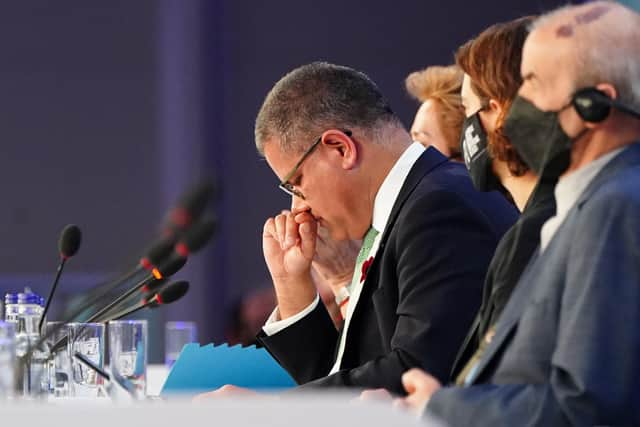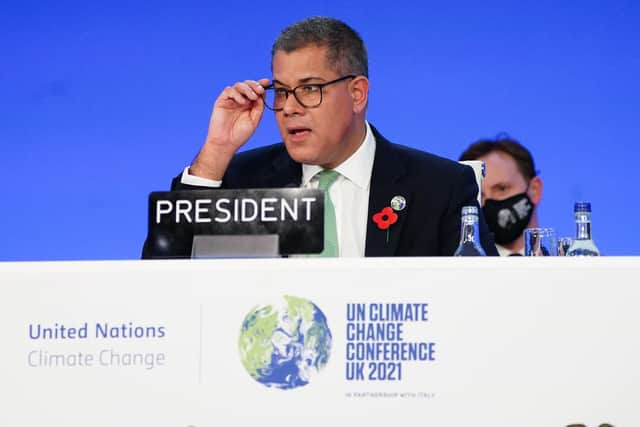Cop26: Alok Sharma's tears will add to pressure on India and China to act on climate, says Yorkshire scientist
Piers Forster, a Professor of Climate Physics and founding director of the University of Leeds’ Priestley International Centre for Climate, said Mr Sharma’s genuine emotion at the end of the two-week summit underlined to a global audience what had just happened with the negotiations.
Mr Sharma was close to tears on a couple of occasions during an hours-long final plenary on Saturday, including as he apologised to delegates for the way a change to the pact’s wording on fossil fuels was brought about at the eleventh hour.
Advertisement
Hide AdAdvertisement
Hide AdFollowing a push by China and India, it was decided to change the language from accelerating the “phase out” of unabated coal, to “phase down”, a move that prompted angry responses from European and vulnerable countries.


Professor Forster said: “You do always get these final demands occurring but interestingly it was played out so publicly because it often happens behind closed doors.
“I think that was Alok Sharma wanting to tell the world he was very uncomfortable with the compromise and he wanted to India to own it.”
He said Mr Sharma’s emotion as the revised deal was passed, “really did tell the whole world who the uncooperative countries were”.
Advertisement
Hide AdAdvertisement
Hide Ad“It told the whole world that COP could have been more ambitious if it wasn’t for India and China. I think that was quite a good thing to communicate.”


Professor Forster said he had no doubt the emotion from Mr Sharma had been entirely genuine.
“The whole UK team were trying really hard to get the best deal. He was genuinely disappointed,” he said.
Mr Sharma said yesterday that China and India will have to “justify” their decision to manoeuvre for the Glasgow Pact’s coal pledges to be watered down, according to the Cop26 President.
Advertisement
Hide AdAdvertisement
Hide AdHe told the BBC’s Andrew Marr Show that China and India would have to “explain themselves” after representatives from countries most at risk of rising seas and changing weather patterns expressed “disappointment” on the floor of the summit at the move.


Mr Sharma said his display of emotion came after two years of hard work and a lack of sleep in the final days of the summit.
“In terms of what happened yesterday, we managed to get an enormous amount over the line. On a personal level, I have invested enormous amounts of the last two years into this.
“I’ve been out to see countries, talked to people on the front line of climate change, and of course I’d had about six hours sleep in 72 hours previously, so it was an emotional moment.”
Advertisement
Hide AdAdvertisement
Hide AdAsked whether his emotional reaction to the change in language on coal was an admission of failure, Mr Sharma replied: “I wouldn’t describe what we did yesterday as a failure – it is a historic achievement.”
Professor Forster said despite the disappointment over that pledge, in general Cop26 had resulted in the “best outcome we could have hoped for”.
He said one of the key achievements was getting countries to have to return with new emission cut plans at next year’s Cop summit in Egypt - with nations previously only required to produce proposals for what are known as Nationally Determined Contributions (NDCs) every five years.
“The NDCs India and China submitted were really disappointing and they didn’t really increase their ambitions at all. What the change does is hopefully bring some international pressure to bear to try and get better commitments from India and China.”
Science 'made it into final agreement'
Advertisement
Hide AdAdvertisement
Hide AdProfessor Piers Forster says he was satisfied with efforts “to get as much science as possible” into the final Cop26 agreement.
As well as being part of a delegation from the University of Leeds at the summit, his work also involved being part of the team briefing national negotiators on the latest climate science, as well as meeting with other national climate council representatives to share and learn best practice.
“We were trying to convey the urgency of the science and get as much science as possible into the final document.”
A key outcome of the talks was the conclusion of the so-called Paris rulebook - making the 2015 Paris Agreement fully operational.
Advertisement
Hide AdAdvertisement
Hide AdIts central aim is to keep a global average temperature rise this century well below 2 Celsius and to drive efforts to limit the temperature increase even further to 1.5 degrees Celsius above pre-industrial levels.
Mr Sharma said: “We have kept 1.5 degrees alive. But, its pulse is weak and it will only survive if we keep our promises and translate commitments into rapid action.”
Read more:
Support The Yorkshire Post and become a subscriber today. Your subscription will help us to continue to bring quality news to the people of Yorkshire. In return, you'll see fewer ads on site, get free access to our app and receive exclusive members-only offers. Click here to subscribe.